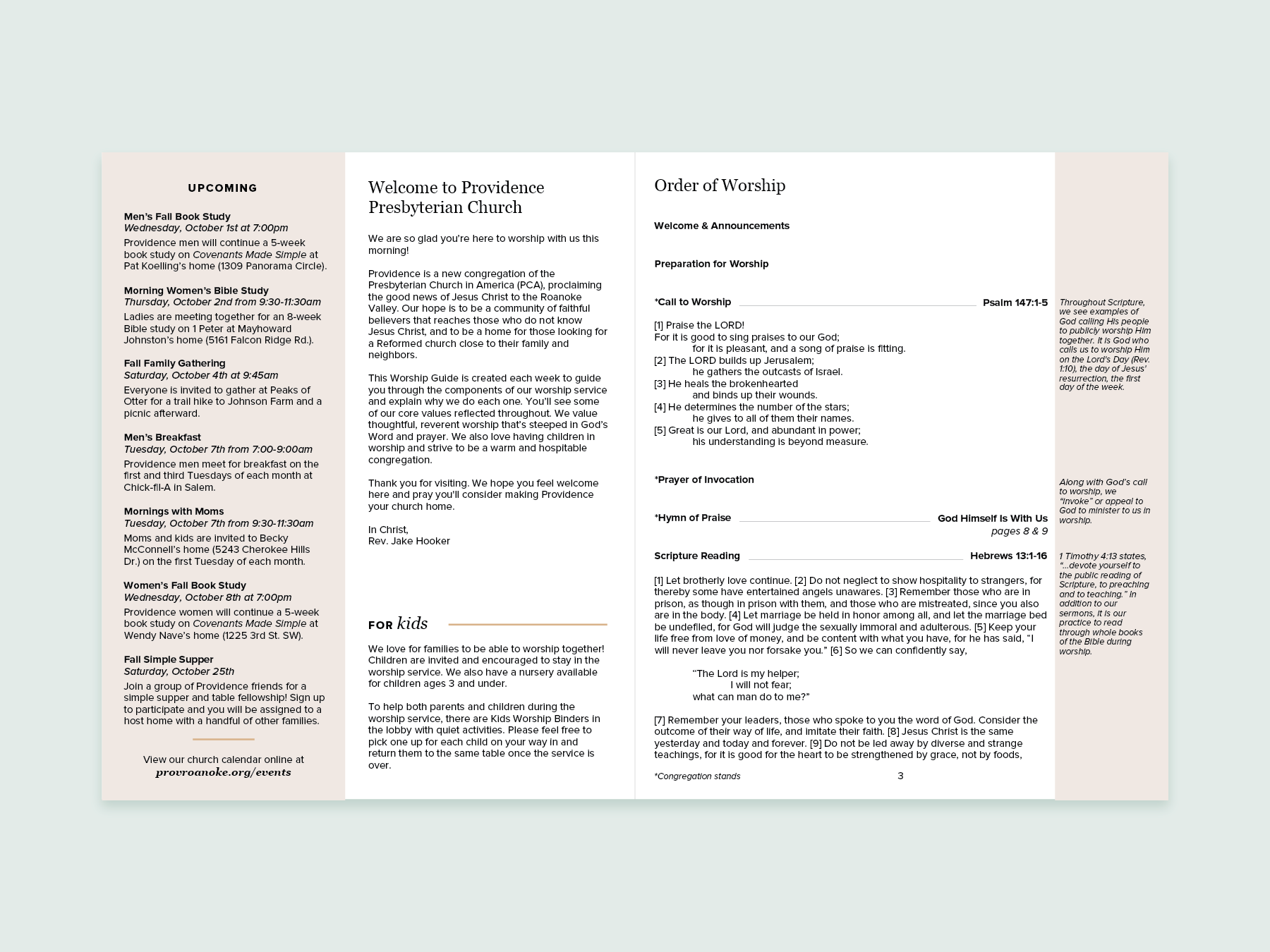The Secret to Church Unity - Philippians 2:1-4
Humility is a very difficult subject to talk about. Humility is a very difficult subject to talk about because the moment you think you’ve grasped it, it slips through your fingers. It’s not something you can parade or put on display. True humility is recognized not by self-proclamation, but by quiet, consistent patterns of service and self-forgetfulness.









But in our passage Paul isn’t necessarily describing how one becomes personally humble as much as he’s describing the effects of widespread humility on the church.
If someone asked you today to give them ten ways to unite a church, what would you say? Maybe you’d start with obvious answers: strong leadership, a clear vision or mission statement, engaging programs. A church without leadership or a clear direction can aimlessly wander about, but none of those things are what Paul points to. According to Paul, humility is the key to church unity.
First he tells them to be of the same mind and then he shows them what that actually looks like—laying aside selfish ambition, counting others more significant than ourselves, and looking to their interests.
In Philippians 2:3, Paul plainly says: “Do nothing from selfish ambition or conceit, but in humility count others more significant than yourselves…”
He doesn’t tell the Philippians to hire a consultant, launch a new ministry, or spend hours creating church policies. He tells them to humble themselves. And that’s precisely where church unity begins with humility—your humility, my humility.
Paul tells the Philippians, and by extension us as well, that church harmony is rooted in humility.
Paul shows us that there are two elements to a humble, unified church. First is our shared foundation (vv. 1–2) produces, secondly, a shared result (vv. 3-4).
Humility may not feel glamorous, and it certainly doesn’t draw attention, but it is the glue that binds the body of Christ together. It turns competition into collaboration, suspicion into service, and conflict into reconciliation. When each member of the church is willing to consider others as more significant than themselves, the whole body flourishes. Differences are no longer threats; they become opportunities for growth, learning, and mutual encouragement.
Which logically flows out of what we looked at in chapter 1. Obviously, Paul didn’t put in the verses and section headings. All those things were added to your Bible later. The book of Philippians is the Apostle Paul’s thoughts under the guidance and direction of the Holy Spirit. And so, he left off in chapter 1 encouraging the church in Philippi to remain unified even in the face of opposition.
Our shared foundation (vv. 1-2)
And now he’s giving away the secrets to church unity. Notice how the Apostle Paul begins chapter 2. He opens with an “if-then” statement. And the reason he does that should be obvious: if what he grounds everything in is true, then that will produce results. Which is why he begins in verse 1 with, “So if there is any encouragement in Christ, any comfort from love, any participation in the Spirit, any affection and sympathy…”
Each one of these little phases are packed with meaning. Just the little phrase in Christ, is a theologically rich phrase. It’s one of Paul’s favorite ways to describe the believer’s relationship with Jesus. It speaks of our faith and vital union with Jesus Christ. To be “in Christ” means His victory is now your victory. It means you’ve died to the reign of sin and been raised to new life. It means your heart of stone has been replaced with a heart of flesh. And it means that one day you will share fully in the glory of the new heavens and the new earth. That little phrase, in Christ, is a reference to all the blessings that our Lord bestows upon believers.
Really all the other phrases flow out of that one. So when Paul mentions, “any comfort from love,” he’s not talking about love in general or comfort from love that we may experience within the life of the church. Paul has something more specific in mind and he’s making a logical connection: if you’re in Christ then you’ll find comfort from His love.
You see, all of these “if” phrases find their grounding in your relationship with Jesus Christ. It’s also true for any participation in the Spirit. Paul is telling the Philippians that they all share and participate in the same Holy Spirit.
Even the “affection and sympathy” that Paul mentions points us to Christ. He is gentle and lowly, the One who does not crush a bruised reed or snuff out a smoldering wick. In Him we find a tenderness and compassion that never runs dry.
And so Paul is building to what comes next. Because if all these things are true, then it’s going to require something of them. They’re going to have to do something, because action flows out of right theological beliefs. You can’t embrace the truths of verses 1–2 about the encouragement of Christ, the comfort of His love, and the fellowship of the Spirit without it shaping how you treat other people. Theology is never meant to sit in a notebook or stay abstract in your head. It’s meant to travel from your mind to your heart to your hands.
By the way, this isn’t just true for Christians, it’s true for everyone! What you believe in your heart of hearts is what determines how you live. Your actions are the fruit of what you believe to be true. A person who believes life is ultimately meaningless will live differently than someone who believes every moment has eternal significance. A person who believes money or power is the highest good will act accordingly. In the same way, a Christian who truly believes the gospel will inevitably begin to live in humility, service, and love. True doctrine always produces transformed lives.
The response of all Paul’s truth claims are found in verse 2.
Look at what Paul says again: “So if there is any encouragement in Christ, any comfort from love, any participation in the Spirit, any affection and sympathy, 2 complete my joy by being of the same mind, having the same love, being in full accord and of one mind.”
Paul is challenging the Philippians here. What would make him happy as the one who brought the gospel to them would be to see them as a unified body. Paul wants them to complete his joy by being of one mind. He wants to see the Philippians come together as a church. Oftentimes, we assume that the problems in the first century church are completely foreign to the problems we face. But as we’ve seen, the Philippians were facing opposition and as we’ll see in a few weeks, personality conflicts between two women: Euodia and Syntyche.
We certainly don’t face all the challenges today that the first century church faced, but personality conflicts are nothing new!
Paul’s point is hopefully obvious: if you have even tasted even a drop of Christ’s mercy, you share something incredible with every other believer. You share Christ. That’s the church’s foundation. As the hymn tells us, “The church’s one foundation is Jesus Christ her Lord.”
Hopefully, this isn’t anything new to you. I hope you know that Jesus Christ is what all of us share as Christians. The truth is, I think we can take this for granted, but the implications are tremendous.
Because having a shared foundation runs deeper than merely having the right doctrine. I’m totally in favor of all of us having the right doctrine. And of course, we’re closer than anyone else to having the right doctrine because we’re Presbyterian!
In all seriousness though, doctrine isn’t supposed to be information that we consume. The glorious truths that we discover in God’s Word are supposed to impact our lives, and the way we treat one another.
Earlier this week, I was speaking with someone and I told him that one of the benefits of being in a small church community is that you’re not a face in the crowd. You can be known in a smaller church community. But one of the challenges of being in a smaller church community is that you can be known.
The truth is as you get to know people, you see their flaws, struggles, and yes, even their sin much clearer. And there’s a tremendous temptation to start defining people by their weaknesses, frustrations and sin struggles. When people at church start to really annoy you is when it should be clear that you’re a part of a church family.
A mark of a healthy church is our ability—not to excuse sin or sweep it under the rug—but to see one another first and foremost as sinners saved by the grace of God. Jesus Christ has forgiven them and washed them in his blood. So why is it so hard for you and me to forgive when we’ve been sinned against, especially by people in the church?
There’s a reason we recite the Lord’s Prayer every week. We need to remind ourselves regularly that He has forgiven our debts, so we must be willing to forgive our debtors too.
It’s easy to lose sight of our shared foundation, isn’t it? It’s easy to lose sight of the fact that we share Jesus Christ.
This is precisely the Apostle Paul’s point! The church’s foundation in Jesus Christ is everything. Seeing ourselves and our brothers and sisters in Christ as blood-bought sinners is the lens we must see one another through.
A shared result (vv. 3-4)
Because the reality is, if we see everyone through the lens that Jesus Christ sees them that will do something in us. Which is precisely Paul’s point! He moves from talking about the foundation we share in Christ in verses 1-2 to encouraging humility in verses 3-4.
Look at verses 3-4 with me: “Do nothing from selfish ambition or conceit, but in humility count others more significant than yourselves. Let each of you look not only to his own interests, but also to the interests of others.”
Faith in Christ should tamp down selfish ambition and conceit. When you truly grasp the gospel—that you were saved not because of your merit but entirely by God’s grace—it fundamentally reshapes the way you see yourself. It dismantles the illusion of self-importance.
It cools the fires of pride and the need to compete for recognition. When Paul says, “Do nothing from selfish ambition or conceit,” he’s saying that your faith in Christ should melt away all arrogance, pride, and self-importance like a flame melts wax. The gospel helps you see yourself as you truly are.
But the gospel isn’t supposed to just affect how you think of yourself—it also affects how you view those around you. After all, the Apostle Paul instructed the Philippians to, in humility, count others more significant than yourselves.
Notice Paul doesn’t say, “see who’s most important and least important and then treat them accordingly.” Paul says, in humility, count others more significant than yourselves. An individual’s socio-economic status is irrelevant, his or her ethnic makeup doesn’t matter, their family history is beside the point. The gospel of Jesus Christ should humble us to the point where we can look at those around us and consider them as more important than me.
This is radically countercultural. Everything in our world pushes us to compare, rank, and measure ourselves against others. Social media trains us to think in terms of followers, influence, and platforms. Career ladders encourage us to see colleagues as competitors rather than people to serve. Even in the church we can slip into quiet comparisons—who sings better, who leads more, who’s more “spiritual.” Paul explodes that whole mindset. When the gospel has done its work in our hearts, we begin to see our church family as fellow recipients of grace.
Just imagine how weird it would be if on Christmas you got a gift from your father and you took it from him, opened it up, and instead of showing humility, gratitude and thankfulness you simply said, “I deserved this. I’ve earned this.”
That’s a Christian puffed up on pride. A prideful Christian is an oxymoron. Because if you truly understand the gospel of grace, how Jesus Christ took on human flesh to save sinners, the only proper response is humility, gratitude, and thankfulness.
Which means you don’t need to jockey for position or recognition. It means I don’t have to guard my ego every time someone else succeeds. Instead, I’m free to celebrate their gifts, to serve their needs, and to look for ways to lift them up. Humility isn’t debasing yourself; it’s thinking of yourself less so that you can think of others more. This posture doesn’t diminish you—it actually enlarges your capacity for love, patience, and unity in the church.
Just consider the impact this could have on the church? What would Providence Presbyterian Church look like if everyone truly counted others as more significant than themselves? What would our church body look like if we were concerned about others than we were about ourselves? That would have a revolutionary impact on our church body!
We are all tempted, at times, to look upon one another with suspicion or to assume the worst about the people around us. That’s a destructive and sinful pattern to fall into. In many ways, it is a subtle form of pride, because it assumes that my perspective is always right, that my motives are purer than someone else’s, or that I alone know the right way to do things.
The gospel, however, calls us to something better. Because if you’re humble you’re going to be charitable—you’re going to believe the best about your brothers and sisters, to give them the same grace we ourselves need.
When we remember how patient Christ has been with our faults, it softens our hearts toward the faults of others. Instead of suspicion, we begin to cultivate trust; instead of harshness, gentleness. Again, that doesn’t mean ignoring sin or failing to confront what is wrong, but it does mean our first impulse is not judgment but mercy. And that requires humility.
I once heard a business guy say that if you really want to build a business that will stand the test of time, stop thinking about how to make money and start thinking about how you can help as many people as possible.
Paul’s point is that your humility and my humility are the “secret sauce” of church unity. Presbyterians tend to think that shared theological convictions are the key to a unified body and of course, to an extent that is true. But what we sometimes forget is that the glorious truths of the gospel must imbed themselves deep into our hearts and ultimately impact the way we live our lives.
Do you remember what Jesus said in John 15? “I am the vine; you are the branches. Whoever abides in me and I in him, he it is that bears much fruit, for apart from me you can do nothing.”
Being in Christ, having faith in Him, trusting in His holy Word, that’s what will bear fruit in your life.
What good is it to memorize Bible verses, stories, and catechism questions if it has no impact on the way we live our lives?
God’s truth should humble you and change the way you treat those around you.
Conclusion:
I know I’ve mentioned this before but right before, but the great protestant reformer, Martin Luther, right before he rediscovered the glorious doctrine of justification by faith alone—he kept noticing a Biblical pattern—God’s mercy was lavishly poured out upon those who humbled themselves before him.
The prodigal son is a great example of this, right? The younger son squanders everything, then “comes to himself” and returns to his father saying, “Father, I have sinned against heaven and before you. I am no longer worthy to be called your son” (vv. 18–19). His humility opens the door for the father’s lavish grace.
But first, he “came to himself.”
The reality is, you have to recognize that you’re a sinner. And not just a sinner in the sense that you’re a “little flawed,” or have made a few mistakes in your life, but as someone who has fallen short of God’s glory—someone in desperate need of God’s mercy, forgiveness, and grace. That recognition—that sober understanding of who we are before a holy God—is the foundation of true humility.
A right understanding of who you are before God is also going to give you a proper view of those flawed, sinful, broken people around you. After all, how on earth can you think of yourself as better than anyone else if you’re a recipient of God’s grace through Jesus Christ?
You and I become more compassionate, long-suffering, and understanding when we see those around us individuals who are just as desperate for God’s mercy as we are. When that’s our mentality we’ll be less likely to judge, criticize, or elevate ourselves above them.
This is all a part of Paul’s point: Pride divides; humility unites.
“Do nothing from selfish ambition or conceit, but in humility count others more significant than yourselves. Let each of you look not only to your own interests, but also to the interests of others.” Church unity begins with humble hearts—hearts that recognize their own weakness, are aware of their own sin, and choose to honor and serve others despite it.
So as we leave here today, remember: Church unity begins with you. It begins with me. It begins in hearts submitted to Jesus, transformed by His mercy, and committed to honor others above yourself. When that happens, Providence Presbyterian Church will not only stand strong even in the face of opposition, but it will shine brightly as a testimony of Christ’s transformative love to a watching world.
Amen. Let’s pray together.
